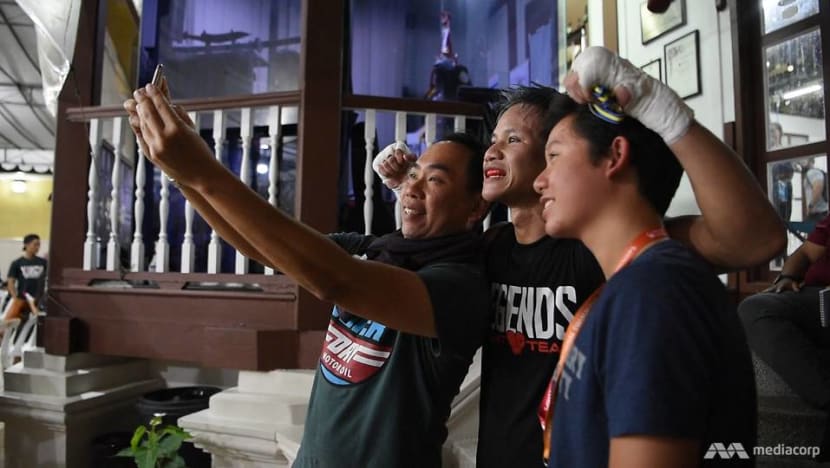The Singaporean boxer who wouldn’t quit, in the ring and in business
Despite lacking a manager, fighting a contract battle and almost throwing in the towel, Muhamad Ridhwan is still in the game, driven by his dreams — for himself, his boxing gym and the country.
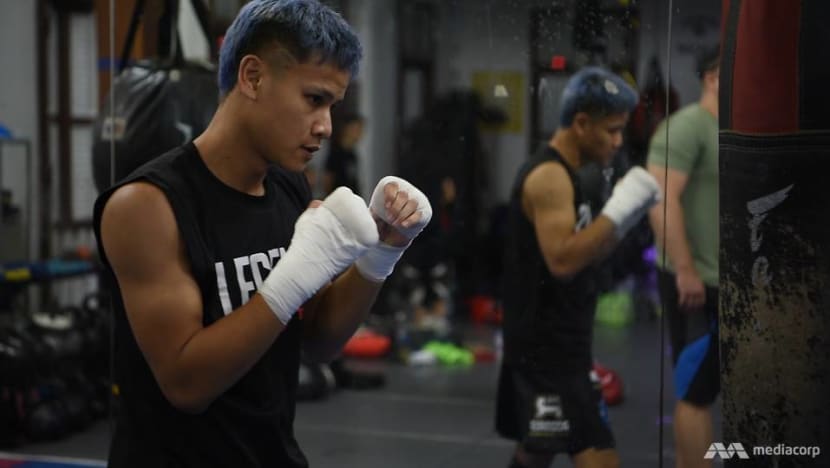
Muhamad Ridhwan Ahmad is the first Singaporean boxer to become a professional world champion.
SINGAPORE: He had taken more punches than he would have liked, in a fight that went the distance. But it was one that Muhamad Ridhwan Ahmad ultimately won — with one good hand.
Minutes after the cheers from the crowd had died down, off came the hand wraps, revealing a swollen knuckle on the right. The three-month-old injury had got worse since his last fight.
But nothing was going to stop him from relishing his victory on home ground over Indonesia’s second-ranked bantamweight Noldi Manakane.
As he put on an ice pack, the Singaporean pro boxer said, full of hope: “We might be the underdogs in the local Singapore sports scene, but I think we’ve proven that we can bring the people together.
“My dream is not only to be the world champion one day, but also to bring the whole nation together with my fist — my swollen knuckles.”
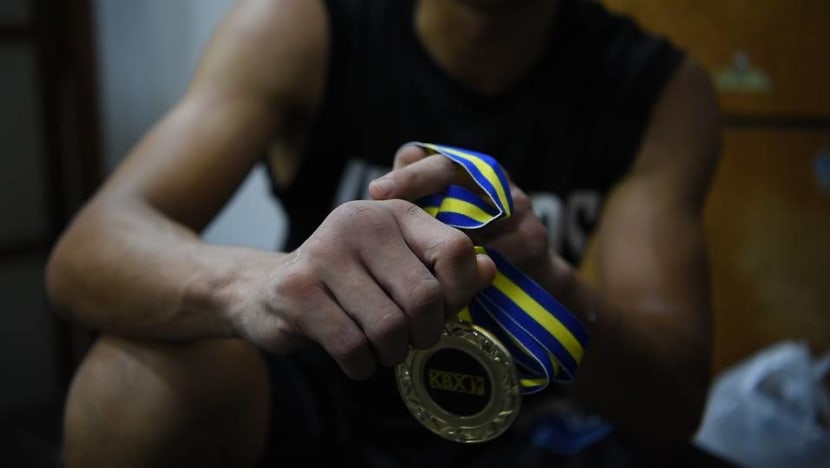
Rousing words from someone who has refused to knuckle under to pressure in the past nine months, a “roller-coaster ride” that began with September’s split decision loss in a world title fight, followed by another defeat in March.
READ: Boxing: Muhamad Ridhwan fails to claim Singapore’s first IBO world title
The 31-year-old also lost his manager and his long-time trainer. He is locked in a contract battle with fight promoter Ringstar, which still owes him half his purse money from his title tilt. He almost wanted to retire.
But he is fighting for his dreams, trading blows as a pugilist while taking chances as the co-owner of a boxing gym, a business borne out of his love for boxing and desire to take the sport further in Singapore.
At a time when fitness centres and fight gyms are giving him more competition outside the ring, it has been “mentally very taxing” to manage both his personal passion and business commitments, he admitted. And he has “sacrificed so much”.
But as his comeback win a fortnight ago shows, he is intent on living up to a Japanese proverb emblazoned in his gym. It says: “Fall down seven times, stand up eight.”
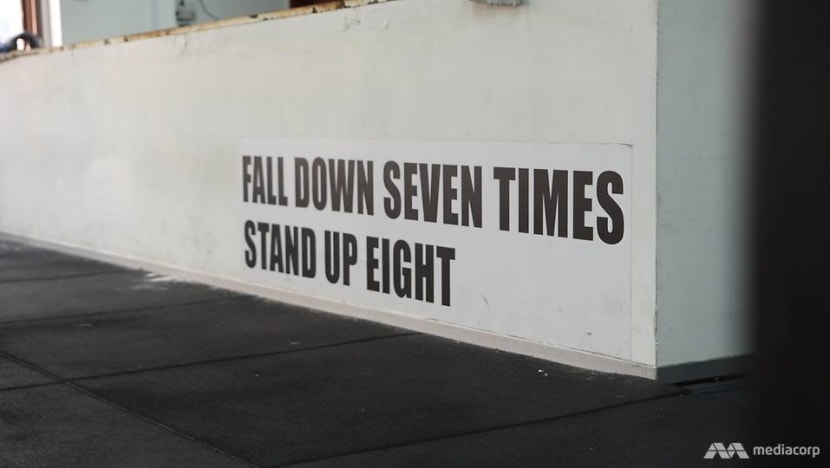
CHANCING UPON THE SPORT
Ridhwan, nicknamed The Chosen Wan (TCW), became Singapore’s first professional world champion in the sport when he won the Universal Boxing Organisation world super featherweight title in May 2017.
But he wants to rule the ring in one of the four major boxing organisations, such as the World Boxing Council, which ranked him 25th in the world at featherweight last year before he tumbled out of the top 40.
Despite the slide, his belief that “boxing is something (he) can be really, really good at” has not wavered. Nor has his love for the sport.
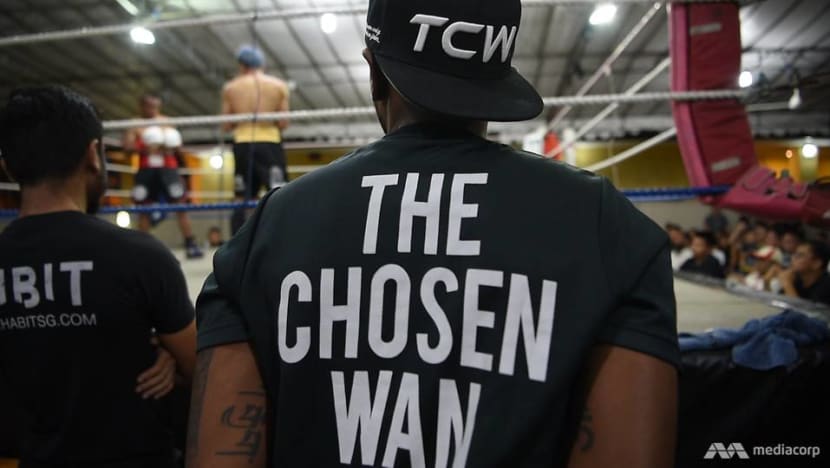
It was not exactly love at first sight, however, when he was introduced to boxing as a 16-year-old. He was a cook in a kitchen where his older colleagues were “always talking about boxing”.
“There was a television there, and it showed classic boxing fights. And that got me interested,” he recounted.
His colleagues kept mentioning one name: Syed Kadir, who represented Singapore at the 1972 Munich Olympics. So the first boxing school the teenager joined was the Olympian’s.
But within months, he became disillusioned. Doing the basics, like skipping, running and the basic punches, were “dull”, unlike the boxing films he had watched, such as Rocky and Cinderella Man.
“I didn’t see much sparring back then. And it didn’t feel (as if) the sport was going anywhere,” he recalled.
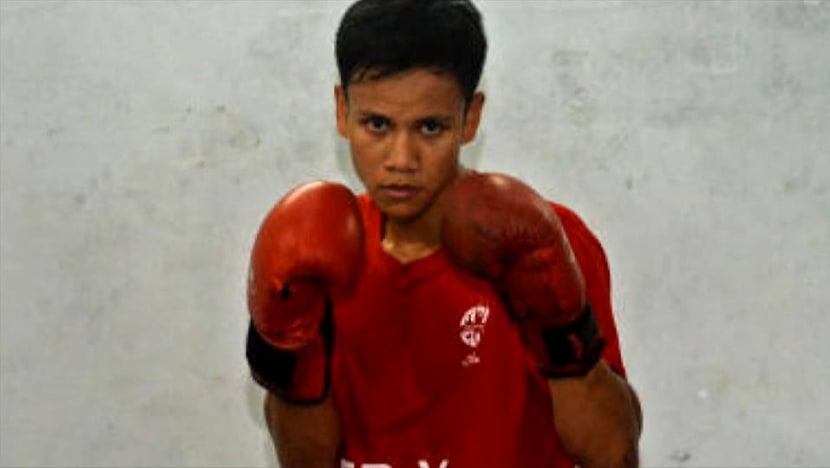
On the day he was going to dump his boxing gloves, his coach told him there was an opportunity to fight two months later, in a local tournament.
“I said, ‘Okay, why not? It should be easy, right?’” he recalled with a smile. “I prepared as best as I could. I was still working full-time … I was able only to train maybe once or twice a week.”
He was still full of confidence and felt “super ready”. But he lost in the first round, a defeat that “brought out the fighting spirit” in him. Lessons learnt, he worked on improving his boxing techniques.
At the age of 23, in the 2011 Southeast Asian (SEA) Games, he bagged a bronze, a feat he repeated at the next two Games.
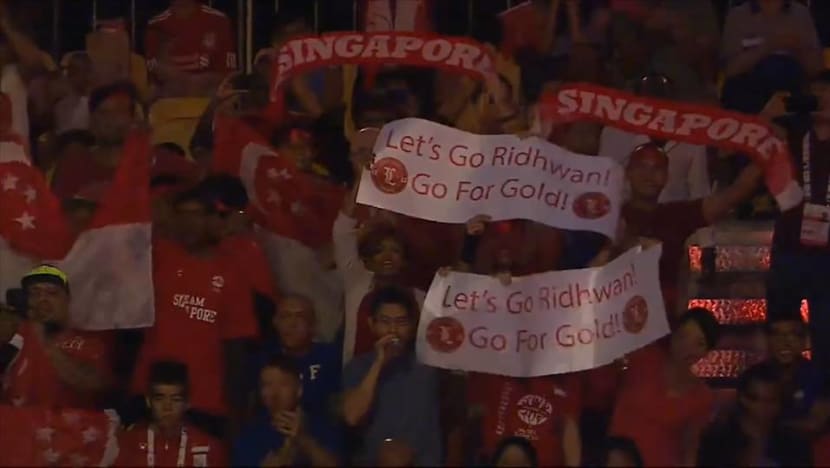
In 2014, two years before he turned pro, he and his friend Fairuz Mohamed set up their boxing gym Legends Fight Sport because he believed the sport needed coaches before it could go further in Singapore.
“I’ve travelled to Sri Lanka, Australia and many other countries to compete and to experience the coaching levels. And I realised that in Singapore, we do have a lot of talent, but we don’t have the knowledge,” he explained.
To date, he is the only boxing coach here to receive a coaching scholarship — to Hungary — from the International Olympic Committee.
SETBACKS AND COMPLICATIONS
When it comes to his pro boxing career, Ridhwan is the first Singaporean to hold the World Boxing Association’s Asia Featherweight Championship belt, which he clinched in 2017.
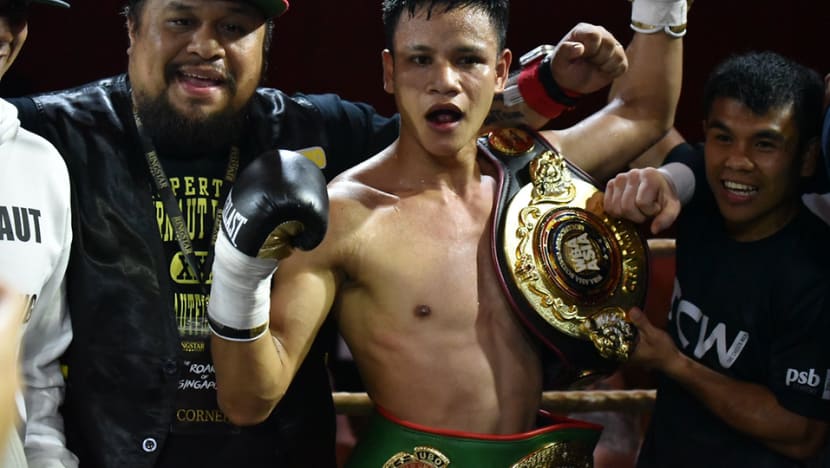
He started with 11 straight wins (eight knockouts), before his winning streak came to a halt last year.
Previously as an amateur who fought, by his count, about 140 to 150 fights, he had lost “a lot of times”. But the difference as a pro, he said, is that he lost “in front of thousands of people, not only in Singapore but internationally”.
“And I’m on YouTube. Everyone can see that over and over,” he added. That was how he felt before he started to accept that losing is “part of life”.
“That you have to be undefeated, I think, is overrated already. I think what matters more, what’s more courageous, is if you’ve lost and you can come back … until you reach your goals.”
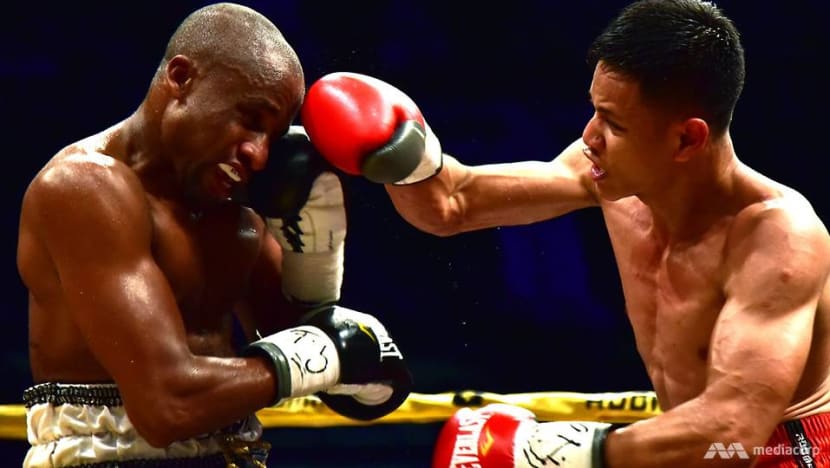
In the end, losing his title fight against Namibian boxer Paulus Ambunda was not as “painful” as seeing people in his team leave — “people who I thought would be with me till the very end because they said they would”.
While his ex-trainer, former Philippine amateur boxing champion Rey Caitom Jr, had decided to return to the ring, ex-manager Scott O'Farrell, the then chief executive officer of Ringstar Asia — which holds Ridhwan’s contract — has switched to Ambunda’s camp.
Not once, however, did Ridhwan mention any names to CNA Insider when describing how “the negative news kept coming”.
“It opened my eyes to a lot of things: How some people just viewed me as an asset for their company or for their investment,” he said instead. “I won’t say it’s betrayal; I’d say it’s business, it’s all business.”
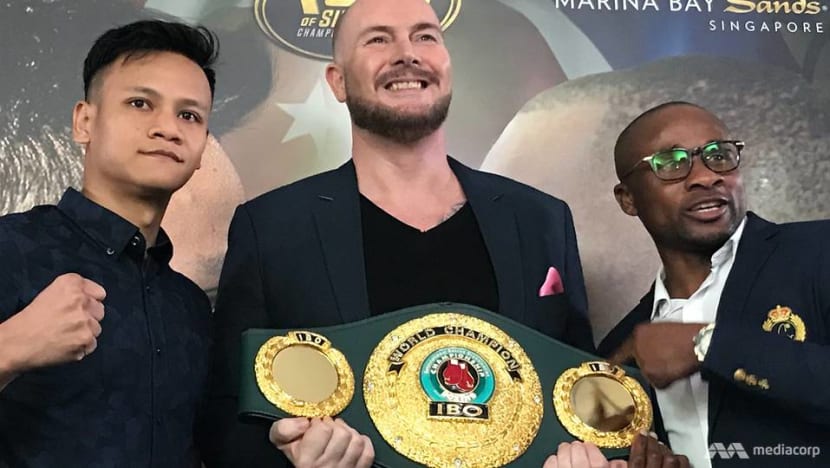
Bound to his contract, but with a struggle with Ringstar brewing, he threatened at first to retire — even announcing it on Facebook in January.
He has since sought out a legal team to get the S$15,000 owed to him and to “find the best solution … a middle ground”.
“But it’s a bit hard because the people in the company are avoiding me. They aren’t in the office, so it’s a bit tricky right now,” he said.
Of the lessons he has learnt from the boxing world, one is that “in life, you’ve got to give more than you take, like in boxing — you’ve got to give more punches than (you) take”.
This is something he has applied to his boxing gym, which works with groups like Trybe, a charity serving the youth, especially those facing adversity.
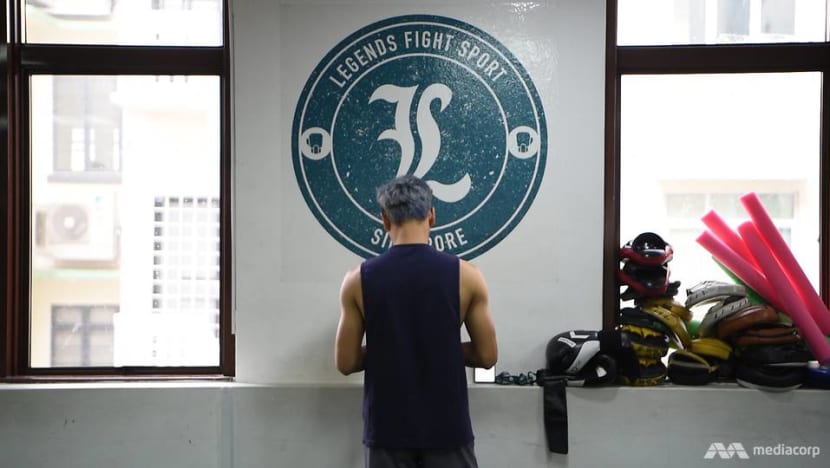
“(The business) must benefit the community. It must benefit the well-being of the people. That’s why our rates are … competitive, even though we’re in the Central Business District (Carpenter Street),” he said.
“We open our doors to at-risk youth and the Yellow Ribbon Project. We’ve been working with these people, and they’ve shown tremendous improvements. That’s one of the best rewards for doing what we do.”
RISING UP TO THE CHALLENGE
Ridhwan has seen how the sport can make a difference on many levels, including in his life. He has, for example, become “more focused”.
WATCH: The fighter who wouldn’t quit (even when his allies did) (5:52)
Boxing also got him to go back to school, which he had dropped out of before he first donned his gloves.
Explaining his change of heart, he said: “One day, a youngster came up to me and said, ‘You know what, Ridhwan? I want to be like you. I don’t have to go to school. I’ll just do boxing.’
“Then I realised I was creating the wrong kind of influence … Second, I learned to love to learn.”
Encouraged by others as well, he studied for a Diploma in Sport and Wellness Management at Nanyang Polytechnic. That was where he met his business partner, and how their boxing gym came to be after they graduated.

Through hard work and perseverance, Legends Fight Sport became profitable within a year. But the gym soon faced competition from fitness centres that started offering boxing classes.
That took away some business, but Ridhwan believes the true boxing enthusiast will go to a training gym dedicated to the sport.
“People who love the sport, who love to learn the skills — the techniques — wouldn’t go through the motions and just get tired at the end of the day,” he said.
“And the fact that we’re only focusing on boxing (means) we make sure that this is something we’re really good at.”
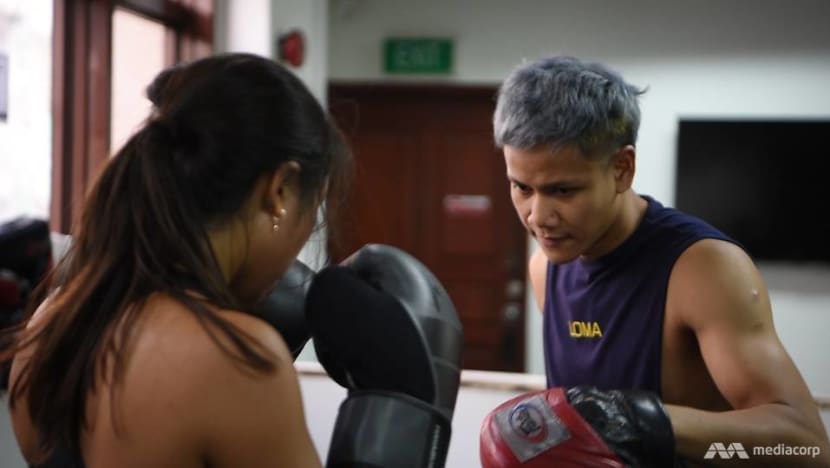
But committing to training of the highest standards while competing for international titles in the ring can be “very tiring”.
“Sometimes I work the whole day, from 7am to 10pm straight. I have a two-hour break in between, and that’s supposedly my training time,” he shared. “And it goes on for days or weeks.”
He sees it as a necessary sacrifice, proffering this quote on success: “If we keep doing what’s easy, life’s going to get hard. I believe that if you keep doing what’s hard, somehow in the near future, things will get easier.”
For now, however, it is challenging times. He needs more funds to train with his new coach Alexey Volodin, who is based in Kuala Lumpur, and to get “quality sparring partners” overseas.
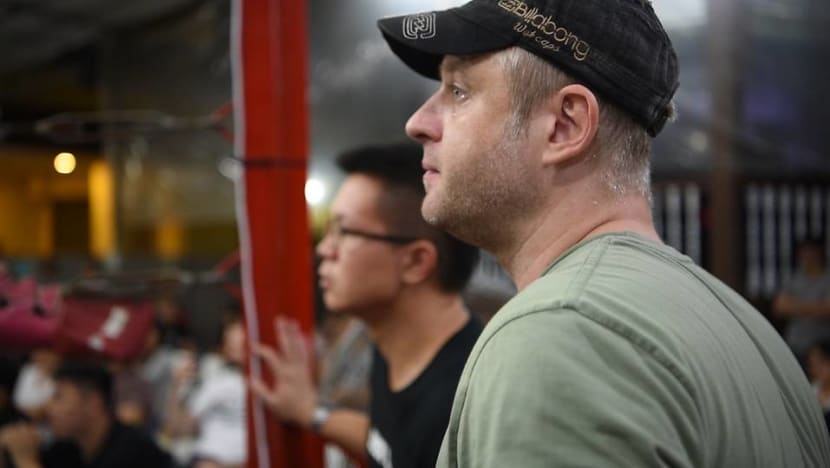
He plans to have at least three or four more fights by year end — his next fight is on Aug 17 — to get his ranking “up to at least top 40 or top 30”.
“I hope, by then, I can get a sponsor to show that I’m climbing up,” he said. A promoter who can give him high-profile fights, “which pay a lot more”, would also be a great help.
With or without that kind of added boost, he has already banished all thoughts of hanging up his gloves.
“I have to retire on my own terms — not because the sport forces me to retire or because … I need to try to make the business better. For now, I believe I can make both work,” he said.
And he believes he can keep rising up to the challenges.
Muhamad Ridhwan was also featured on Money Mind, and you can watch the episode here. New episodes every Saturday at 10.30pm.
